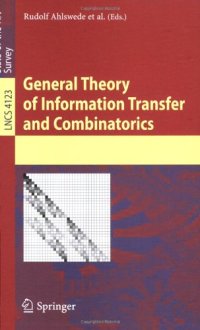
Ebook: General Theory of Information Transfer and Combinatorics
- Genre: Mathematics // Combinatorics
- Tags: Algorithm Analysis and Problem Complexity, Discrete Mathematics in Computer Science, Numeric Computing, Computer Communication Networks, Data Structures Cryptology and Information Theory, Algorithms
- Series: Lecture Notes in Computer Science 4123 : Theoretical Computer Science and General Issues
- Year: 2006
- Publisher: Springer-Verlag Berlin Heidelberg
- City: Berlin; New York
- Edition: 1
- Language: English
- pdf
This book constitutes the thoroughly refereed research papers contributed to a research project on the "General Theory of Information Transfer and Combinatorics" that was hosted from 2001-2004 at the Center for Interdisciplinary Research (ZIF) of Bielefeld University and also papers of several incorporated meetings.
The 63 revised, full-papers presented were carefully reviewed and selected for inclusion in the book. The papers are organized in topical sections on probabilistic models, cryptology, pseudo random sequences, quantum models, statistics, probability theory, information measures, error concepts, performance criteria, search, sorting, ordering, planning, language evolution, pattern discovery, reconstructions, network coding, combinatorial models, and a problem section.
This book constitutes the thoroughly refereed research papers contributed to a research project on the 'General Theory of Information Transfer and Combinatorics' that was hosted from 2001-2004 at the Center for Interdisciplinary Research (ZIF) of Bielefeld University and also papers of several incorporated meetings thereof.The 63 revised full papers presented were carefully reviewed and selected for inclusion in the book. The papers are organized in topical sections on probabilistic models, cryptology, pseudo random sequences, quantum models, statistics, probability theory, information measures, error concepts, performance criteria, search, sorting, ordering, planning, language evolution, pattern discovery, reconstructions, network coding, combinatorial models, and a problem section.